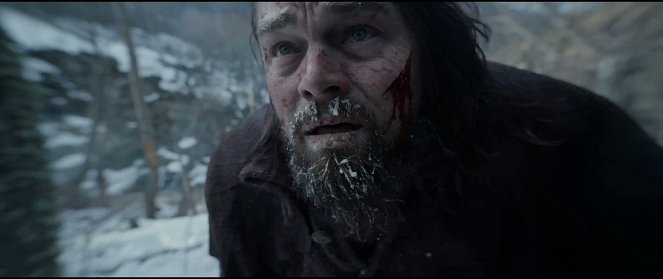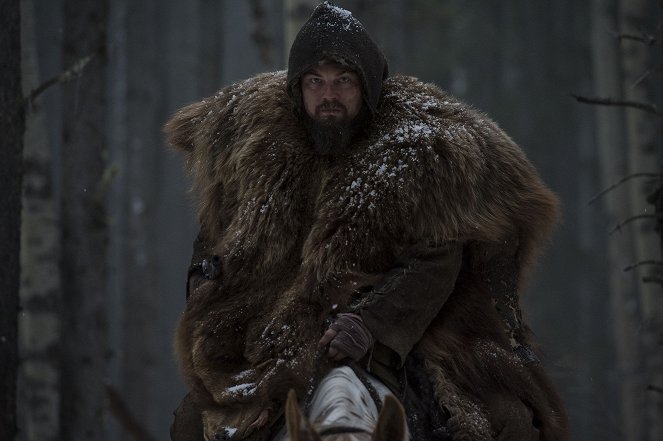Reżyseria:
Alejandro González IñárrituZdjęcia:
Emmanuel LubezkiObsada:
Leonardo DiCaprio, Tom Hardy, Domhnall Gleeson, Will Poulter, Forrest Goodluck, Duane Howard, Arthur Redcloud, Melaw Nakehk'o, Grace Dove, Lukas Haas (więcej)VOD (5)
Opisy(1)
Bohaterem Zjawy jest legendarny odkrywca i myśliwy Hugh Glass (DiCaprio), który zaatakowany przez niedźwiedzia, zdradzony przez jednego z członków wyprawy (Tom Hardy), ledwo żywy zostaje porzucony przez towarzyszy i pozostawiony na pewną śmierć. Wbrew wszystkiemu udaje mu się przeżyć. Zmagając się z bezlitosnymi zimowymi warunkami, wytrwale i desperacko brnie przez dzikie tereny, gnany miłością do rodziny i nieokiełznaną żądzą zemsty. (Imperial Cinepix)
(więcej)Materiały wideo (20)
Recenzje (16)
Well, I was 100% sure that I would be delighted and I was already formulating enthusiastic compliments in my head. And then nothing. Revenant is a great ninety-minute survival movie that unfortunately last 150 minutes. The rest is filled with ambition supported with shallow Indian mysticism. The attempts at transcendental ideas unfortunately lead to nowhere, they are just Iñarritu confidently scratching the surface. It’s not only that they don’t work, but they also end up utterly harming the core story and its characters. I didn’t see Hug Glass on the screen even for a moment. It’s always Leonardo DiCaprio performing art under Iñarritu’s direction. Disappointed as hell and the current 83% in view of the 66% for Birdman is a bad joke.
()
Leo will finally get his Oscar. And not because he turned in a better performance than in The Wolf of Wall Street, but because of how much he had to suffer for it. Such a large-scale and, thanks to its locations and weather, true survival movie with a stellar cast and cinematography by Lubezki does not need a thicker plot. IT IS ENOUGH THAT IT EXISTS. Just like it is enough for the Eiffel Tower to just stand there. Because for several decades there will be no other filmmaking project of similar proportions. The funny thing is that The Revenant’s lack of a denser story is criticized by the same viewers who repeatedly went to see the over-filtered Mad Max: Fury Road, in which there is not a single real exterior and someone drives a car through the desert for two hours only to decide to turn around just before reaching their destination. The story of The Revenant is a continual struggle for survival. The betrayal of a friend, meeting a Native American with a bleeding heart, helping the defenseless innocent. And the consequences of all of this. Fate and our ability to influence it. Karma. And for us contemporaries, also the realization that while we hope to have a good time, people before us hoped to survive. Every day. The Revenant’s poetic passages are not pseudo-art; they are art for masses, similar to those of Ridley’s Gladiator, just less cheesy, because Iñárritu expects some development from the mass audience over a decade. Alejandro, it’s incredible what you’re willing to do (and risk) to shoot the hitherto unseen. Chivo, you are a god. Amazing sound and makeup. By comparison, Alive and The Edge become mere snowflakes in The Revenant, flying in the wind of Dances with Wolves. Thank you, cinematography, once again after a long time. This is what I live for.
()
There aren't many of these realistically dirty, narratively unkempt films that feel like the filmmakers have actually gone back 200 years, and actually I can't remember any from the last few years. Raw action, where you can feel the blood and pain, physical contact fights taken in one long shot, and beautiful visual compositions of breathtaking nature; and snow and mud and filthy actors everywhere – the film crew must have had their fun too. The simple story doesn't hurt at all, because it goes to the heart of the characters and their physical and mental hardships. The complete opposite of the mannerist, self-absorbed Birdman, where I didn't care about the characters' fates at all. Together with Sicario, the best film of 2015.
()
In the same way that we talk about the “Hitchcockian” attributes of some thrillers and use the term “Lynchian” to describe weird films, we may soon find ourselves relating the name of Mexican director Alejandro González Iñárritu to movies around which media buzz is artificially created. As was the case with Birdman from the year before last, the hype that accompanies The Revenant is far greater than the attention that the film deserves based on its cinematic qualities. With their respective skills, the dream team of Iñárritu, Lubezki and DiCaprio could have made one of the most powerful adventure movies of recent years. Unfortunately, their straightforward B-movie plot couldn’t be “boosted” by the fluid camerawork, which performs even more captivating tricks than we could see in I Am Cuba (for me, the benchmark when rating films with sophisticated long shots). The story of a man chewed on by a bear, who returns “home” in the manner of Odysseus, is interspersed with mystical dream (hallucination) sequences, dialogue about God reincarnated as a squirrel and manifestations of the devastating nature of unregulated capitalism. Iñárritu, who always takes delight in the suffering of his characters, would be the ideal director for a raw western in the traditional mould, in which violence serves as the main means of communication, sets the action in motion, sets up the plot twists and solves problems. Unfortunately, as pointed out above, he decided to communicate meanings in ways other than through spectacular violence. With words, for example. The use of violence as a central narrative element is justified by its insertion into the unsteady framework of a family melodrama, enchanted by Indian mysticism. I am convinced that The Revenant would have been a tonally and rhythmically more balanced film if it had not so stubbornly pretended to have philosophical depth and tremendous spiritual reach. Unlike in the case of Tarkovsky or Malick, the spiritualism in this film is limited to empty words and unoriginal symbolism. The formalistic aspect is in no way uplifting. Besides the motif of the spiral engraved on the canteen, for example, the cyclical concept of time, which is inherent to the indigenous American population, only highlights the repetitiveness of the protagonist’s suffering. Otherwise, the film has a thoroughly standard structure, with precisely timed twists, conscientious utilisation of all motifs and a satisfying ending that leaves no essential question unanswered. It’s okay for one-dimensional characters to serve as tools for conveying information and pushing the narrative in the required direction, but I don’t think it’s okay if they serve no other purpose, despite the film’s attempt to use them to convince us of its own inventiveness and its commitment to a cause (in this case, the interests of Native Americans; see the documentary about the making of A World Unseen, which is basically very naïve anti-capitalist and environmentalist agitprop). For me, the most fitting metaphor for the film, which outwardly criticises pragmatism but is at the same time supremely pragmatic in the handling of its characters and themes, remains the gif of the lead actor as Hugh Glass buried alive, torn and broken, clawing for his dreamed-of Oscar with his last ounce of strength. 65%
()
(mniej)
(więcej)
One hundred and fifty minutes of art that offers real physical adventure in only two battles. There's clearly something wrong with a film where you spend most of the runtime thinking about the freezing crew on the other side of the camera. I haven't seen something so "wanted" in a long time. Just hand over the coveted statue and let this one fall in as technically honest and damn difficult filmmaking, which perhaps nobody even cares about in the end. PS: Hardy beats DiCaprio by a dead bear and half a horse.
()



Reklama